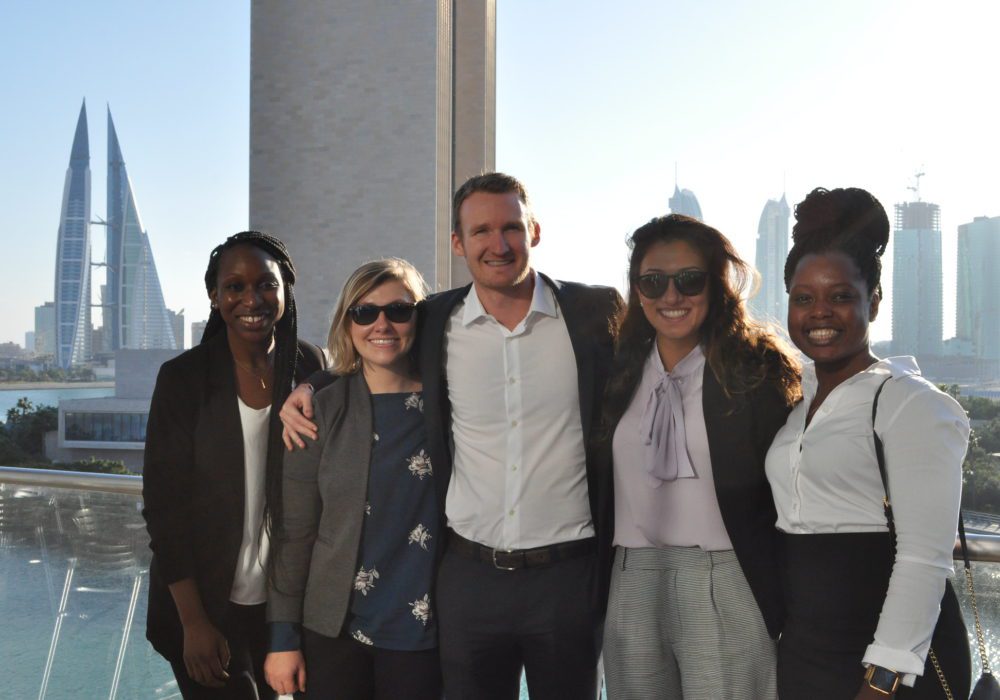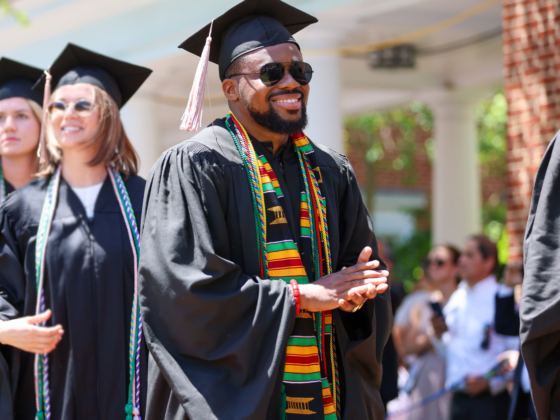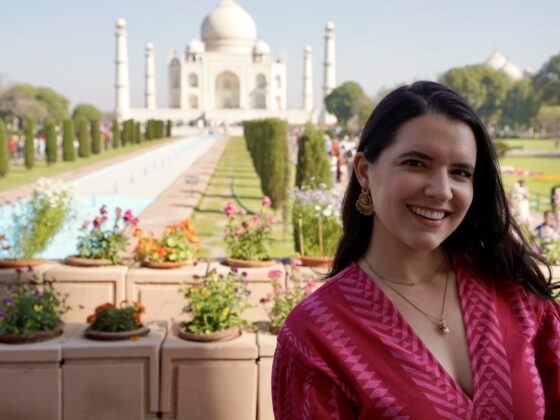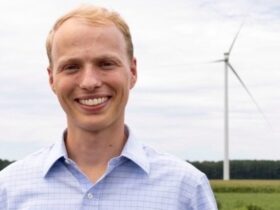Cameron Hector (center in photo above) is currently a second year student at Darden. Prior to starting his MBA degree, he studied business management economics at UC Santa Cruz and worked in a variety of roles at Randstad, a global HR services leader. Cameron completed a consulting internship with Medtronic last summer, with a particular focus on the LATAM market needs. This January, Cameron participated in the Darden Worldwide Course to Dubai and Bahrain with Professors June West and Paul Simko. He shared a few reflections from the course, in his own words:
Prior to this DWC course, I was quite unfamiliar with the Middle East. I knew some of the major U.S. political decisions in the Middle East, such as the war in Iraq, and that oil played an important factor in the Middle East, however, that was the extent of my knowledge. Therefore, my intentions for this course were to better understand the Middle East both in business and as a whole.
Fortunately, Paul Simko recommended a fantastic book, Desert Kingdoms to Global Powers, which describes the uprising of the Middle East over the past 50 years. It delved into the importance of oil within the Middle East, inter-country relationships between the GCC, Iraq, Iran, and other Middle East territories, and the ambitious project planning tied to large amounts of accumulated wealth. This reading created an important base knowledge for better understanding what we experienced and saw on the ground.
Our course began in Bahrain where we learned about banking and the financial sector. With over 17% of Bahrain’s GDP earned from financial services, it was ideal to hear from leaders at Ahli United Bank, Arcapita, and Bahrain Fintech Bay. Because our group project also focused on finance, we were able to compare Bahrain’s financial sector to UAE’s. Both countries have demonstrated rapid and expansive growth, improved regulatory conditions, and international influence. Furthermore, the regulatory conditions seemed to support new business ventures and endeavors within Bahrain. Having never considered starting a business in Bahrain, it now seems like a logical option, especially if you’re interested in building a global presence.
We were then exposed to the industrial sector. It was incredible to see the large Aluminum smelting facilities at Alba and the environmentally focused projects at GPIC. What was most impressive, however, were the introductions to top leadership officials within the country. I was astounded by the GPIC CEO and his high-level view on business and the political relationship between the GCC and the U.S. He was charismatic, personable, and humble. He made us feel that Darden has a special bond with Bahrain and we should continue to build its’ strength.
In the UAE, it was exciting to tour the streets of Dubai and visit iconic destinations in Abu Dhabi. We were fortunate to gain knowledge about renewable energy, the staffing industry, and the political realm, but my bigger takeaway was from experiencing the city itself. The contrast between Bahrain and the UAE creates vastly different impressions. In Bahrain, I felt a sense of peace and stability. Although traffic was fairly rough, I didn’t get the same fast-paced feel as I did in Dubai. As soon as we stepped foot into Dubai, there was a certain sensation of luxury and excitement. The metropolitan aspect seemed critical in attracting well known businesses and support for expansion. The GCC clearly shows an understanding of long-term vision and the perseverance to work towards it.
This course ultimately enhanced my view of how the Middle East operates both in business and in a political sense. As I understand it, the GCC relies heavily on the United States government and military support provided. Throughout the course, I felt a general appreciation for the U.S. and desire to maintain these close relationships. Through my readings, it also reinforced the idea that if the U.S. were to pull out, it would create uncertainty on how the GCC continues could continue operating as a whole. I also get the sense that the country is spending unprecedented amounts of energy and resources to diversify away from oil and building strong alliances with countries other than the U.S. to prepare for a potential U.S. departure. Knowing this, I’ll closely follow what happens in the Middle East over the next 5-10 years as it and the world stage evolves. I have now also gained a confidence in the GCC’s ability to build towards large visions and expect some amazing achievements to occur through its’ near-term growth.
In conclusion, I’m extremely grateful for this Darden Worldwide Course and the opportunity to better understand the Middle East. I comprehend the uniqueness of each Middle East country. Not just the UAE and Bahrain, but Saudi Arabi, Iran, Iraq, Egypt, and the relationships these countries have built. The DWC just tapped the surface for understanding the Middle East and I’m looking forward to gaining more exposure through business and personal experiences in the near future.





